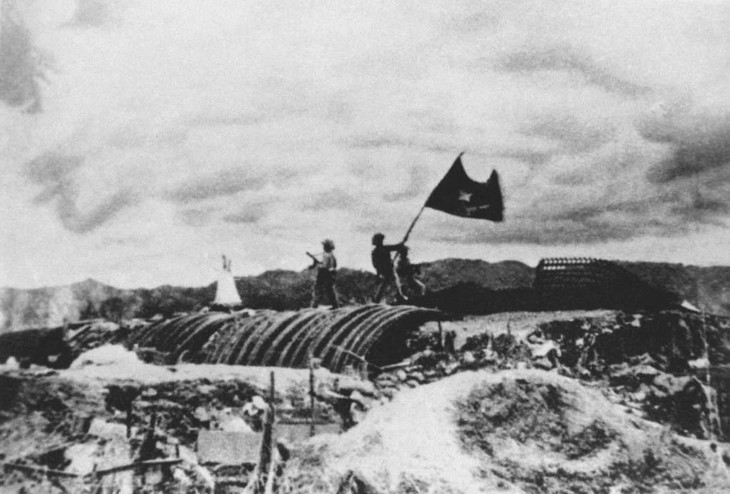(VOVWORLD) - On May 7, 1954, the Vietnamese army and people won the historic Dien Bien Phu victory which resulted in the signing of the Geneva Agreement ending the war and restoring peace in Indochina, paving the way for the reunification of Vietnam in 1975. 69 years after the Dien Bien Phu victory, the peoples of Vietnam and France are now fostering friendship and cooperation.
 On May 7, 1954, the Vietnamese army and people won the historic Dien Bien Phu victory (Photo: Archive photo/VNA) On May 7, 1954, the Vietnamese army and people won the historic Dien Bien Phu victory (Photo: Archive photo/VNA) |
Dien Bien Phu battle: a landmark of Vietnam’s liberation struggle
The Dien Bien Phu battle in Muong Thanh valley, Dien Bien province between the Vietnam People’s Army and the French army was the biggest battle of the 1st Indochina war.
President Ho Chi Minh described the Dien Bien Phu victory as the most glorious victory of Vietnam’s history and an immortal epic of the people's war. General Vo Nguyen Giap said Vietnam made a legend come true.
The Dien Bien Phu victory resulted in the signing of the Geneva Agreement to end the war and restore peace in Indochina, abolish the French rule, and recognize the independence of Vietnam, Laos and Cambodia.
Half of Vietnam was completely liberated, ushering in a new revolutionary period of building the North in peace, transitioning to socialism, and preparing a solid rear for national reunification.
The Dien Bien Phu victory not only influenced Vietnam's history but changed the world situation, paving the way for the national independence movements of colonial and dependent countries.
Jean Pouget, Attaché of General Henri Navarre of France, said the Dien Bien Phu victory was referred to by all national liberation revolutions in Asia, Africa, and America. Dr. Christian C.Lentz of the University of North Carolina at Chapel Hill said the Dien Bien Phu battle changed the world. From 1954 to 1964, 17 out of 22 French colonial countries gained independence. In Africa alone, in 1960, 17 countries declared their independence. History calls 1960 "Africa Year".
New page in Vietnam-France relations
19 years after the Dien Bien Phu victory, on April 12, 1973, France became one of the first Western countries to establish diplomatic relations with Vietnam. Since the late 1980s, France has helped Vietnam settle debts with creditor countries which were members of the Paris Club - a group of 22 countries with large economies, specializing in providing financial services and loans for national reconstruction, debt grace or postponement, and debt relief for countries who had difficulty in paying.
In 1993, Francois Mitterrand became the first French President to come to Vietnam, marking an important turning point in bilateral relations and in France’s strategies and policies in Southeast Asia and the Asia-Pacific region. He came to Hanoi and declared: “I’m here to close one page of history and to open another”.
On the 40th anniversary of bilateral diplomatic ties in 2013, the two countries signed a Joint Statement, creating a strategic partnership.
Over the past 5 decades, the Vietnam-France relationship has become stronger, deeper and more effective. Since the adoption of the EU-Vietnam Free Trade Agreement (EVFTA), bilateral trade has grown steadily, reaching 8.5 billion USD last year.
France is now Vietnam's leading trading partner in the European Union and Vietnam’s leading European donor. Vietnam ranks second among France’s ODA recipients in Asia, with a total committed capital of 18.4 billion USD since 1993.
 Benoit Guidée, Director General of the Asia-Australia Department of the French Foreign Ministry (Photo: VOV) Benoit Guidée, Director General of the Asia-Australia Department of the French Foreign Ministry (Photo: VOV) |
Benoit Guidée, Director General of the Asia-Australia Department of the French Foreign Ministry, said: What makes Vietnam-France relations special, beyond political dialogue, is the degree of density in the relationship between the two peoples. More than any other country in Asia, the Vietnam-France cooperation in terms of associations, culture, youth, students or research has grown steadily."
"At the level of friendship associations or local governments, there are always very strong foundations for the relationship between the peoples of our two countries. That is what makes our bilateral relationship especially strong,” he added.
Currently, France is actively implementing a dynamic and comprehensive policy towards the Asia-Pacific region, in which Vietnam plays a pivotal role.
Vietnam considers France an important partner in its foreign policy and constantly works to deepen the bilateral relationship.
Vietnamese Ambassador to France Dinh Toan Thang said: "Vietnam-France relations entered a new period of cooperation after 50 years of establishing diplomatic relations with favorable conditions. We have great cohesion and support from the two peoples and our leaders share the same vision for the bilateral relationship in the coming years."